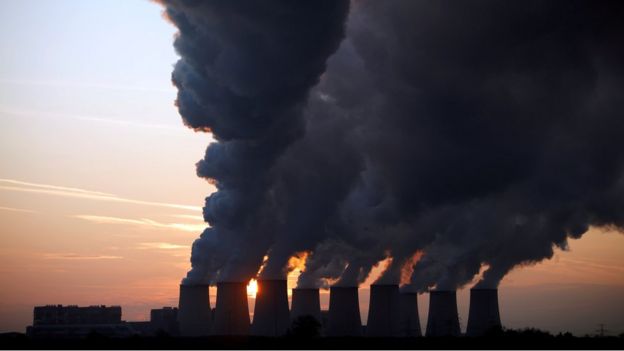US notifies UN of Paris climate deal pullout
But in the notice to the United Nations the US state department said Washington would remain in the talks process.
President Donald Trump drew international condemnation in June when he first announced the US intention to withdraw.
He said the deal "punished" the US and would cost millions of American jobs.
Friday's announcement is seen as largely symbolic as no nation seeking to leave the pact can officially announce an intention to withdraw until 4 November 2019.
- What is climate change?
- What is in the Paris climate deal?
- Five effects of US pullout
The process of leaving then takes another year, meaning it would not be complete until just weeks after the US presidential election in 2020.
Any new US president could then decide to rejoin the agreement.
"Today, the United States submitted a communication to the United Nations in its capacity as depositary for the Paris Agreement regarding the US intent to withdraw from the Paris Agreement as soon as it is eligible to do so," the US statement read.
"The United States will continue to participate in international climate change negotiations and meetings... to protect US interests and ensure all future policy options remain open to the administration."
In June, Mr Trump indicated he was open to another climate deal "on terms that are fair to the United States".
However, key signatories to the accord quickly ruled that out. The Paris Agreement took decades to finalise.
The US stance on climate change also caused divisions at the G20 summit in Germany last month.
- Hawking: Trump's climate stance could damage Earth
- How has the world reacted?
- Tech leaders defy Trump
A joint summit statement said it "took note of the decision of the United States of America to withdraw from the Paris Agreement".
However, leaders of the other G20 members agreed the accord was "irreversible".
What was agreed in Paris?
Climate change, or global warming, refers to the damaging effect of gases, or emissions, released from industry, transportation, agriculture and other areas into the atmosphere.
The Paris accord aims to limit the global rise in temperature attributed to emissions. Only Syria and Nicaragua did not sign up.

Countries agreed to:
- Keep global temperatures "well below" the level of 2C (3.6F) above pre-industrial times and "endeavour to limit" them even more, to 1.5C
- Limit the amount of greenhouse gases emitted by human activity to the same levels that trees, soil and oceans can absorb naturally, beginning at some point between 2050 and 2100
- Review each country's contribution to cutting emissions every five years so they scale up to the challenge
- Enable rich countries to help poorer nations by providing "climate finance" to adapt to climate change and switch to renewable energy
Nasa's Goddard Institute for Space Studies says the world's average temperature has risen by about 0.8C since 1880, two-thirds of that since 1975.
US think tank Climate Interactive predicts that if all nations fully achieve their Paris pledges, the average global surface temperature rise by 2100 will be 3.3C, or 3.6C without the US.
[BBC SOURCES]


No comments